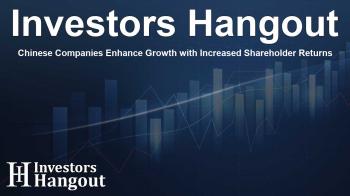Chinese Companies Enhance Growth with Increased Shareholder Returns

Chinese Companies Boost Returns for Shareholders
Chinese firms are currently making headlines by enticing investors with enhanced dividends and strategic share buybacks. This trend is fueled by a recent wave of policy reforms aimed at improving corporate governance in a challenging economic landscape.
Government Policies Encouraging Reforms
The Chinese government is actively advocating for reforms that encourage corporations to distribute dividends more generously. This push is accompanied by directives urging pension and mutual funds to boost their investments in domestic stocks. As a result, corporations are aligning their strategies with government objectives to ensure stable returns for institutional investors.
Dividend Yields on the Rise
As of the end of 2024, data from LSEG indicated that Chinese companies achieved a dividend yield of 2.8%, marking the highest figure seen in eight years. This growth is accompanied by an impressive increase in total cash dividends from over 2,000 large and mid-cap companies, which soared to a record high of 3.4 trillion yuan (approximately $468.84 billion) in 2023. Forecasts suggest an additional rise of 1.2% in dividends for 2024, with projections of an increase up to 8.6% for 2025.
Record Share Buybacks
Within the first eight months of 2024, Chinese A-share listed companies reported unprecedented share buybacks, with around 1,900 firms collectively repurchasing shares valued at over 130 billion yuan. This trend reflects a significant commitment to returning value to shareholders, highlighting the dynamic changes in the corporate landscape.
Growing Interest in Dividend Funds
Similar to corporate governance shifts in countries like Japan and South Korea, the reforms underway in China are enhancing the attractiveness of dividend-focused investment funds. LSEG Lipper data shows a noticeable influx of approximately $8 billion into Chinese dividend funds since 2020, as opposed to only $273 million in the preceding five years. This shift illustrates a growing confidence in the capacity of established firms to deliver consistent returns through dividends.
Key Players in the Market
In 2023, prominent dividend funds like Huatai-PineBridge CSI Dividend Low Vol Idx ETF, Wanjia CSI Dividend Index ETF, and Harvest CSI 300 Dividend Low Volatility Idx ETF recorded impressive inflows, totaling $678.7 million, $598.5 million, and $366.9 million respectively. This indicates a strong shift in investor preference towards companies that prioritize dividend payouts.
Competitive Dividend Payout Ratios
China's dividend payout ratio climbed to 52% by the end of last year, which significantly outpaces South Korea's 27.6% and Japan's 36.1%. This trend positions Chinese firms as attractive options for yield-seeking investors, particularly given the overall market conditions.
Valuation Considerations Amid Opportunities
Despite the positive outlook for dividends, it is important for investors to proceed with caution when selecting stocks. Current valuations for Chinese stocks remain below historical averages. Chinese equities are currently trading at about 13 times forward earnings, comparatively lower than Japan's Nikkei at 15 times and the S&P 500 around 25 times. This presents a unique opportunity, with over 40 companies in China boasting price-to-earnings (P/E) ratios that fall below their dividend yields, making them particularly appealing for investment.
Investment Perspectives
According to Vis Nayar, the chief investment officer at Eastspring Investments, this valuation scenario points to a remarkable chance for savvy investors. He remarked, "On a valuation basis, China is really cheap," underscoring the potential for significant diversification and the advantages of active investment strategies as firms navigate these evolving circumstances.
Frequently Asked Questions
What are the main reasons for increased dividends in Chinese firms?
Increased dividends are largely due to government encouragement for corporate governance reforms and a drive for better returns to shareholders in a competitive market.
How have corporate buybacks impacted investor confidence?
Record levels of share buybacks have reassured investors about the financial health of companies, leading to increased confidence in stock investments.
What is the current dividend yield for Chinese companies?
As of the end of 2024, the dividend yield for Chinese firms was reported at 2.8%, the highest in eight years.
Which dividend funds saw the highest inflows?
The Huatai-PineBridge CSI Dividend Low Vol Idx ETF and Wanjia CSI Dividend Index ETF were among the top funds, attracting significant investor interest.
How do Chinese companies' valuations compare to other markets?
Chinese stocks are trading at about 13 times forward earnings, below Japan's 15 times and the S&P 500's nearly 25 times, presenting potential value opportunities for investors.
About Investors Hangout
Investors Hangout is a leading online stock forum for financial discussion and learning, offering a wide range of free tools and resources. It draws in traders of all levels, who exchange market knowledge, investigate trading tactics, and keep an eye on industry developments in real time. Featuring financial articles, stock message boards, quotes, charts, company profiles, and live news updates. Through cooperative learning and a wealth of informational resources, it helps users from novices creating their first portfolios to experts honing their techniques. Join Investors Hangout today: https://investorshangout.com/
Disclaimer: The content of this article is solely for general informational purposes only; it does not represent legal, financial, or investment advice. Investors Hangout does not offer financial advice; the author is not a licensed financial advisor. Consult a qualified advisor before making any financial or investment decisions based on this article. The author's interpretation of publicly available data presented here; as a result, they should not be taken as advice to purchase, sell, or hold any securities mentioned or any other investments. If any of the material offered here is inaccurate, please contact us for corrections.
